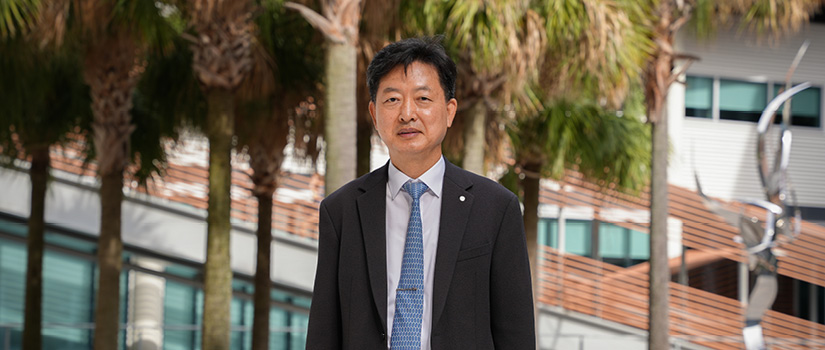Sonoco Visiting Fellow Young Jin Bae speaks on his journey serving as the CEO and President of SE Green Energy
South Korean energy executive Young Jin Bae spent part of the fall semester at the Moore School sharing his experience leading SE Green Energy, a renewable energy company, as well as his 34 years with Korea Electric Power Company. KEPCO is the largest electric utility company in South Korea.
Bae spearheaded the development of several international independent power-producer projects for KEPCO in countries across the Middle East, Africa and Asia. One project included building the 600MW Amman Diesel Power Plant in Jordan; he was the project leader and CEO of the power company. He also developed solar and wind projects around the world during his extensive career.
As part of KEPCO, Bae participated in the first cohort of the Moore School's KEPCO Executive International MBA Double-Degree program. This program allowed Bae the opportunity to visit the Moore School for the first time in 2015.
In October 2023, Bae returned to the Moore School as a Sonoco Visiting Fellow Executive in Residence through the Folks Center for International Business’ Sonoco Visiting Fellows Program. Made possible in part from the generous support of the Sonoco Endowment Funds and The Rachel and Jim Hodges Fund, the Sonoco Visiting Fellows program focuses on bringing widely recognized, world-class senior scholars and practitioners to the Moore School to share their expertise in international business.
As a Sonoco Visiting Fellow, Bae spent two weeks with Moore School students, faculty and South Carolina executives discussing his leadership within the renewable energy and sustainability sector He also shared his new book: Risk and Opportunity: How to Develop International Power Generation Businesses.
Activities Bae participated in while at the Moore School included:
- Speaking in the “Energy Today and Tomorrow” panel at the Global Upstate Conference on International Business & World Affairs providing insight into the new frontier of renewable energy, specifically innovation and growth in Asia.
- Presenting as a guest speaker and panelist at USC’s Net Impact Sustainability Symposium to discuss “Cleaner Energy for a Better Tomorrow.”
- Leading an interactive discussion regarding the global energy industry and renewable energy initiatives with Moore School students at a Folks Center Pathways speaker series event.
- Meeting with Columbia Mayor and Energy Chairman Daniel Rickenmann and Director of City of Columbia Office of Economic Development Ryan Coleman to discuss renewable energy strategies in the City of Columbia.
- Presenting for IB professor David Hudgens’ IBUS 310: Globalization and Business course, which is an internationally-focused class centered on developing a strong understanding of the global dimensions of business and the impact of culture on the conduct of business.
- Meeting with Moore School Dean Rohit Verma and Gregory Niehaus, associate dean for faculty advancement and finance professor to discuss renewable energy and sustainability.
During his Pathways speaker series talk, Bae spoke to Moore School students about balancing and evaluating risk in the international business sphere, specifically when entering emerging markets.
“Business is a force of balance,” Bae said. “Responsibilities, risks and benefits are shared among stakeholders, and among them, risks and opportunities exist together. The way to have opportunities amidst risks is to create a foundation called trust.”
This wisdom not only applies to international projects that Bae has worked on, but also to the foundation of his startup SE Green Energy. When forming his company, Bae said he experienced some pushback from residents about the hydrogen-power generation of renewable energy. Open communication, along with community visits to the power plant, helped residents understand the hydrogen-power generation project and allowed Bae’s efforts to become a benchmark for new companies starting hydrogen-power generation.
Bae explained that cooperation among employees from varying national backgrounds is a true struggle when working internationally.
“The biggest challenge of doing business in other countries is local culture and local integration,” Bae said.
Bae said he believes there is a need for Korea and the United States to cooperate closely on ways to promote new and renewable energy projects and move away from fossil fuels. He said this can start with students at the Moore School’s undergraduate international business program, which was recently ranked No. 1 for the 25th year in a row by U.S. News & World Report.
“This opportunity is an amazing way to share experiences, and I hope that USC alumni from around the world will continue working together to keep the Darla Moore School of Business the central expert of IB in the world,” Bae said.
Hoping for a more sustainable and greener future, Bae told current students during his visit to campus that although “we don’t know the future, we need to prepare for it,” and renewable energy sources are key moving forward.
-Peyton Palazzo
